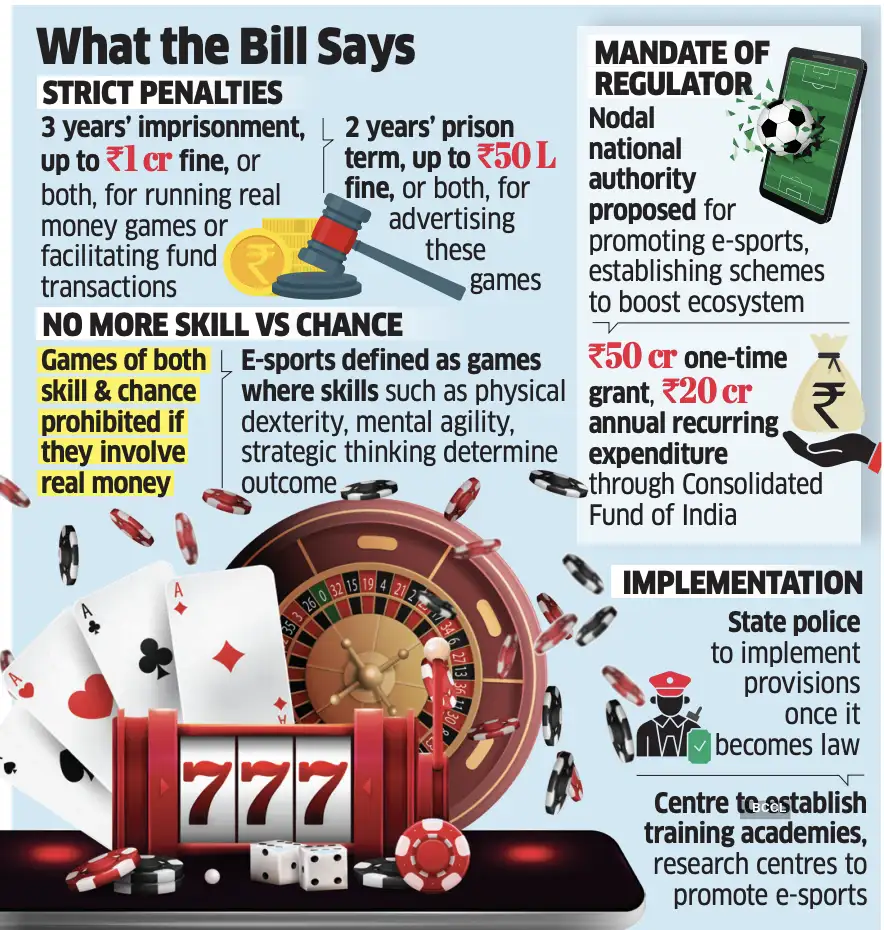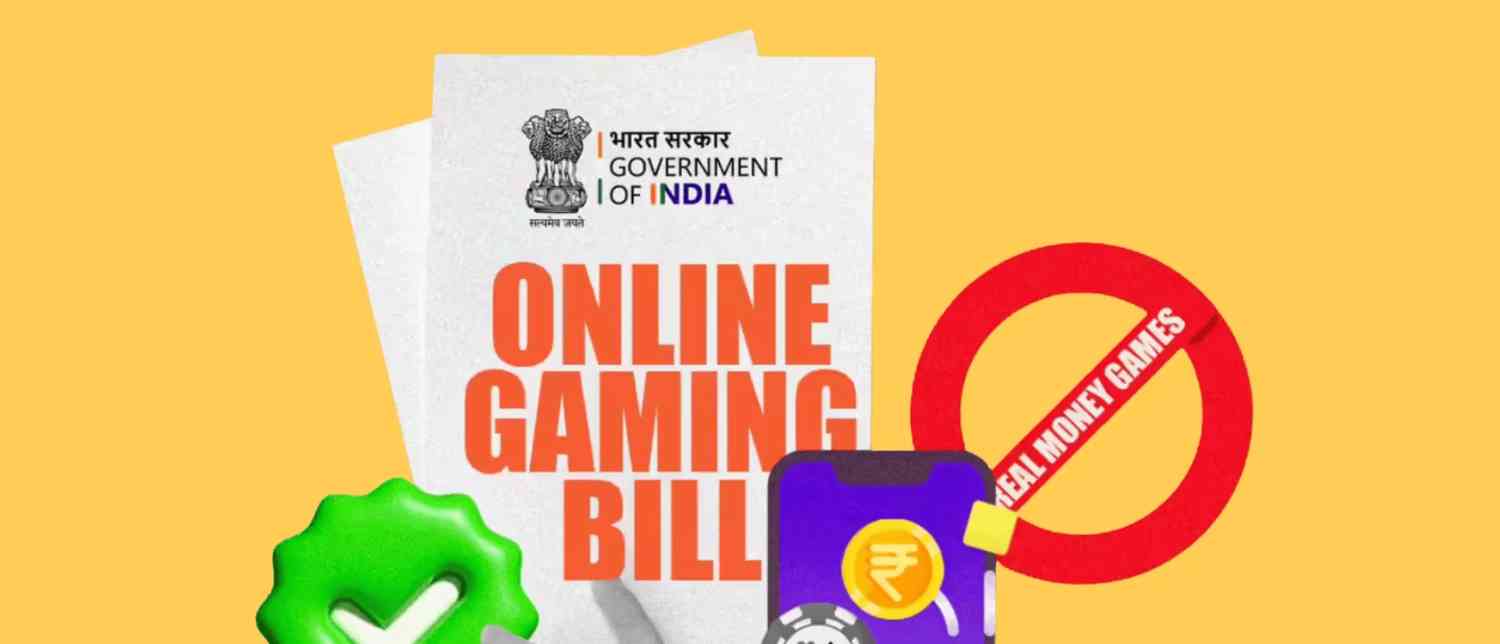The Indian Parliament has passed the Promotion and Regulation of Online Gaming Bill, 2025, marking one of the most significant policy shifts in the country’s digital ecosystem. While the new legislation is being hailed as a bold step to protect youth, families, and national security from the dangers of real-money gaming, it has also sparked serious concerns within the gaming industry, which warns of job losses, closures, and declining investments.
This landmark Bill balances the government’s commitment to safe, constructive digital growth with its determination to eliminate predatory money games that thrive on misleading promises of quick wealth.

Understanding the Online Gaming Sector in India
India’s online gaming industry has seen exponential growth over the past decade, making it a vital component of the digital and creative economy. Broadly, the sector can be divided into three categories:
-
Esports – Competitive, organised video games requiring strategy, teamwork, and skill.
-
Online Social Games – Casual, skill-based, recreational games designed for entertainment, learning, or social interaction.
-
Online Money Games – Platforms where players deposit money with the expectation of monetary returns. This category includes fantasy sports, poker, rummy, and prediction markets.
While esports and social gaming have been recognised for their potential to foster skills, teamwork, and innovation, online money games have been blamed for addiction, financial ruin, money laundering, and even cases of suicide.
Why the Online Gaming Bill 2025 Was Introduced
According to government estimates, more than 45 crore Indians have been negatively impacted by online money games, losing over ₹20,000 crore collectively.
Union IT Minister Ashwini Vaishnaw explained that the government could no longer ignore the dangers posed by unregulated money gaming platforms, many of which operate from offshore jurisdictions.
Key reasons behind the legislation include:
-
Addiction & Financial Ruin: Families pushed into debt due to compulsive gaming.
-
Mental Health Concerns: Cases of depression and suicides linked to losses.
-
Fraud & Money Laundering: Platforms misused for laundering illegal money.
-
Threat to National Security: Some platforms used for terror financing and illicit communications.
-
Closing Legal Loopholes: Extending restrictions already present in physical betting/gambling laws to the digital space.
-
Encouraging Healthy Alternatives: Promoting esports and educational/social games as safe and constructive alternatives.
The World Health Organization (WHO) has also recognised gaming disorder as a mental health condition, further strengthening India’s case for decisive action.
Key Provisions of the Bill
The Promotion and Regulation of Online Gaming Bill, 2025 lays down a comprehensive framework to safeguard users while nurturing esports and social gaming.
1. Applicability
-
The law applies across India and to offshore gaming services targeting Indian users.
2. Promotion of Esports
-
Esports recognised as a legitimate competitive sport.
-
The Ministry of Youth Affairs and Sports will oversee guidelines, training academies, and tournaments.
-
Incentives and awareness programs to integrate esports into national sports policies.
3. Promotion of Social & Educational Games
-
Central government empowered to register and recognise safe games.
-
Focus on education, culture, skills, and digital literacy.
4. Ban on Online Money Games
-
A complete ban on all real-money games, regardless of whether based on chance or skill.
-
Prohibition on advertising and promotion.
-
Banks barred from processing related financial transactions.
5. Online Gaming Authority
-
A central authority to regulate, register, and categorise games.
-
Empowered to resolve grievances and enforce compliance.
6. Offences & Penalties
-
Offering banned games: up to 3 years imprisonment or ₹1 crore fine.
-
Advertising banned platforms: up to 2 years jail or ₹50 lakh fine.
-
Repeat offenders face harsher penalties.
7. Corporate Accountability
-
Companies and officers held liable for violations.
-
Independent/non-executive directors exempt if due diligence shown.

Industry Concerns: Fear of Job Losses and Closures
The Bill has drawn sharp criticism from India’s real-money gaming industry, which employs over 130,000 skilled workers and is valued at $3.8 billion, projected to grow to $9.2 billion by 2029.
Industry warnings:
-
20,000+ jobs at risk.
-
300+ companies may shut down.
-
50% of franchise sports leagues may collapse due to loss of sponsorship revenue.
-
Sponsorship losses could range between 30–40%.
Many companies argue that skill-based games like fantasy sports and poker should not be equated with gambling. Critics say that a blanket ban stifles innovation and deters global investment in India’s digital economy.
Law firms and analysts caution that regulatory stability is essential for investor confidence. Sudden prohibitions may drive capital and talent away from India’s gaming ecosystem.
Immediate Fallout: Dream11, MPL, Zupee Suspend Cash Games
Following Parliament’s nod, top RMG companies such as Dream11, MPL, Gameskraft, and Zupee announced suspension of their cash-based offerings.
-
Dream11: Discontinued pay-to-play contests; users assured of safe withdrawals.
-
MPL: Halted deposits, focusing on free-to-play competitive games.
-
Gameskraft: Suspended rummy platforms like RummyCulture; withdrawal services still active.
-
Zupee: Ended cash games but continues free offerings like Ludo and Snakes & Ladders.
These platforms, some valued at billions of dollars (Dream11 at $8B; MPL at $2.3B), are now reassessing their business models.
Impact on Cricket Sponsorships
-
Dream11, Team India’s lead sponsor, pays around ₹358 crore.
-
My11Circle holds IPL fantasy rights worth ₹625 crore.
-
The future of these sponsorships is uncertain, with the BCCI pledging to follow government policy.
Esports: The Big Winner
While the real-money gaming sector reels under the ban, the esports industry is celebrating.
-
Esports now enjoys government recognition and structured support.
-
Training academies, tournaments, and technology platforms will strengthen India’s global competitiveness.
-
Industry leaders believe this will prepare India for the 2027 Olympic debut of esports.
Akshat Rathee, Co-founder of NODWIN Gaming, called it a “breakthrough moment” that could legitimise esports and place India firmly on the global stage.

Legal Challenges on the Horizon
Reports suggest that gaming groups are preparing to approach the Supreme Court, arguing:
-
The Bill equates skill-based games with gambling.
-
Lack of prior consultation with stakeholders.
-
Severe economic disruption to a thriving industry.
This legal battle could shape the long-term future of gaming regulation in India.
Broader Regulatory Framework
The Online Gaming Bill builds on earlier measures, including:
-
IT Act, 2000 & 2021/2023 Rules – Empowering the government to block illegal gaming websites.
-
Bharatiya Nyaya Sanhita, 2023 – Criminalising unlawful betting and gambling.
-
GST Regime – Increasing tax on online gaming from 28% to 40% in 2025.
-
Consumer Protection Act, 2019 – Preventing misleading ads, with advisories for influencers and celebrities.
-
Cybercrime Reporting Portal & helpline 1930 for scam reporting.
Balancing Innovation with Responsibility
The Online Gaming Bill 2025 is a watershed moment in India’s digital evolution. By banning predatory real-money gaming while recognising esports and educational games, it strikes a balance between innovation and social protection.
For families and youth, it promises a safer digital environment, free from the traps of money gaming addiction. For the economy, it positions India as a global leader in responsible gaming policy.
Yet, the concerns of job losses, investor flight, and industry disruption remain real. Whether the Bill can nurture esports while not suffocating broader innovation will depend on how regulations evolve, how companies adapt, and how courts respond to likely legal challenges.
In many ways, the Online Gaming Bill 2025 is both an end and a beginning — shutting the door on risky gambling models, while opening a new chapter for esports, safe gaming, and India’s digital future.
With inputs from agencies
Image Source: Multiple agencies
© Copyright 2025. All Rights Reserved. Powered by Vygr Media.





















